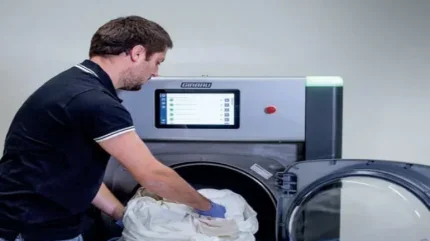
In today’s world, sustainability takes center stage, and Girbau has not just embraced this shift; it’s become an industry leader dedicated to making a significant positive impact on both people and the planet. Girbau’s commitment to sustainability is evident in its core values and business strategy, where it has taken tangible steps to reduce its environmental footprint and set an industry standard.
Girbau’s internal sustainability drive
Girbau’s dedication to sustainability starts from within. The company remains committed to increasing its selfconsumption of renewable energy. In 2022, Girbau installed solar panels across its headquarters and major subsidiaries and manufacturing sites. This initiative continues into 2023 and aligns with Girbau’s goal to achieve carbon neutrality by 2030 for scope 1 and 2 emissions.
To boost efficiency in manufacturing processes and offices, Girbau has made several key changes:
- The adoption of energy-efficient LED lighting across the company.
- Replacing fossil fuel climate systems with electric heat pumps, powered by renewable energy generated from their solar panels or other certified green sources.
- Optimising technical service vehicle routes to reduce emissions.
- Setting up sustainability guidelines for the company’s travel policy.
- Substantial investment in electric and hybrid vehicles for the company fleet.
Developing an efficient and high-end portfolio
Girbau’s commitment to sustainability extends to its products. The company is leading the way by developing more efficient and sustainable solutions that help clients reduce their carbon footprint.
A prime example of this commitment is evident in their latest products: the Genius Washer and the double dryer EDD. The Genius series, with its programmable spin speeds and G-factor of 450, is the most efficient and sustainable option on the market. It reduces energy consumption by up to 15%, thanks to reduced residual moisture after washing. It also boasts advanced connectivity and a weighing system that optimizes water and chemical product consumption.
The new EDD, specially designed for selfservice laundries, maximizes space without compromising on quality. Its features, such as axial airflow and a double-glazed door, enhance energy efficiency and user comfort while minimising heat loss, boosting productivity, and delivering excellent drying results.
Sustainable processes in laundry
Girbau collaborates closely with clients and partners to set industry benchmarks. By working together, the company designs and implements custom sustainable solutions tailored to the specific needs of clients. This approach allows them to create a portfolio of complementary solutions designed to make laundry operations more eco-friendly.
Some of these solutions include:
- Water reuse solutions for washing machines and tunnels that reduce water consumption by up to 50% by collecting water from rinse stages and making it available for pre-wash and wash phases. To address chemical incompatibility issues, Girbau also provides microfiltration recovery systems (RTF) to remove impurities from the recovered washing water, ensuring high water quality for various laundry processes. Additionally, Girbau invests heavily in R&D projects to recover and treat wastewater from laundries, remove emerging micropollutants, and address water scarcity, with prototypes aiming for an impressive 85% recovery rate
- Recovery solutions for residual heat in process water, driven by a life cycle analysis indicating that more than 70% of the environmental impact of washing processes is attributed to energy consumption. Girbau actively collaborates with laundries to install heat recovery devices, using heat from dryers and ironers to pre-heat air and water circuits. This innovative approach significantly reduces energy demand and, consequently, emissions.
- Addressing microplastic emissions: Approximately 35% of primary microplastic emissions result from washing synthetic clothes. Governments worldwide are taking steps to regulate these emissions, directly impacting laundries. Girbau offers a plug-andplay solution for laundries dealing with microplastics, featuring a single membrane filter with up to a 50-micron mesh. The filter centralises wastewater management for multiple washing processes and has a self-cleaning mechanism that aggregates microplastic waste into a solid form for easy disposal, simplifying adaptation to future restrictions and regulations, regardless of laundry layout or equipment.
- Reducing plastic waste: Girbau offers packaging alternatives to replace singleuse plastic wraps, which are facing bans in most EU countries. Their packaging unit provides minimalistic paper wrapping with paper bands, offering an environmentally friendly solution for packaging clean linen.
Finally, through their open and collaborative laboratory, OpenLAB, and the knowledge services division of Girbau University and Consulting, Girbau provides full support and assistance to customers, collaborators, and partners in improving their textile and other processes from the perspective of sustainability, operation, and production, keeping a holistic view.
Vision for the future
Girbau’s vision for the future is both clear and inspiring. Their commitment to innovation, quality, proximity, and sustainability ensures continued value creation for their customers. By reducing their environmental impact and continuously expanding their sustainable product portfolio, Girbau aims to set the industry standard for sustainable laundry solutions.
In a world where sustainability is paramount, Girbau’s journey toward a greener and more sustainable future is a beacon of hope and an exemplary model for others to follow.






